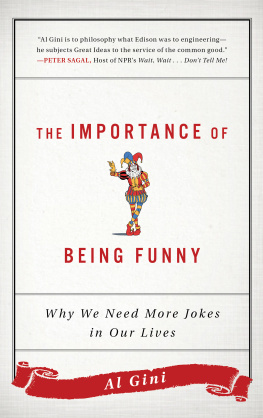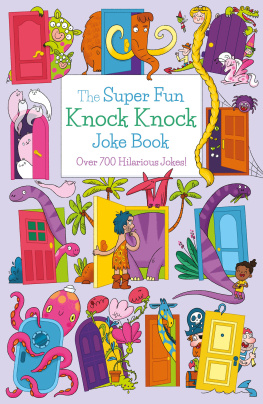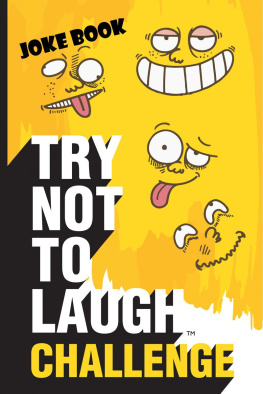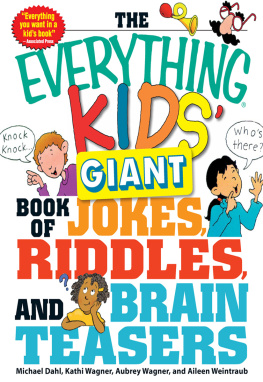The Importance of Being Funny
Praise for The Importance of Being Funny
Ive known Al Gini since I was five years old. I always thought of him as the hilarious kook who lived down the street. Until I read this excellent book, I had no idea that he was, in fact, a gainfully employed, productive member of our society. This book is so insightful, I highly recommend it. We need more Al Ginis in our lives. Thomas Lennon , of Comedy Centrals Reno 911 and CBSs The Odd Couple ; coauthor of the Night at the Museum movies
I have been the victim of some of Ginis early research for this book, being one of his unsuspecting students many years ago. I had intended to attend and listen to boring lectures about dry philosophy subjects. But hed interject humor and therefore make it nearly impossible to forget the lessons. [Shaking fist at sky...] Damn you, Gini! David Pasquesi , Chicagos Second City, HBOs Veep , Improviser of the Year by Chicago Improv Festival
Gini gives us a careful examination of comedy and its central importance in our lives, from the classroom to the boardroom to the bedroom, managing to extricate precisely where, why, and how something can be funny without ever spoiling the good time with pedantic antics. I learned and LOLed simultaneously. Zach Freeman , Chicago Tribune comedy critic
The Importance of Being Funny is both important and funny. The French existentialist Albert Camus said that life is absurd. Gini agrees and argues that, in order to live it well, we need to embrace the absurdity. Laughter isnt just the best medicine but also the very stuff of life. Steven Gimbel , Gettysburg College
Gini attempts to recover the joyfulness of humor by deriving it from the bestand most demandingmaterial of all: the baffling contours of everyday experiences and our uproariously futile attempts to make complete sense of life. Humor, in Ginis hands, is sometimes homey, mostly honest, and ultimately humane. A timely and entertaining offering! Gregory Wolcott, Saint Marys College of California
The Importance of Being Funny
Why We Need More Jokes in Our Lives
Al Gini
Rowman & Littlefield
Lanham Boulder New York London
Published by Rowman & Littlefield
A wholly owned subsidiary of The Rowman & Littlefield Publishing Group, Inc.
4501 Forbes Boulevard, Suite 200, Lanham, Maryland 20706
www.rowman.com
Unit A, Whitacre Mews, 26-34 Stannary Street, London SE11 4AB
Distributed by NATIONAL BOOK NETWORK
Copyright 2017 Rowman & Littlefield
All rights reserved . No part of this book may be reproduced in any form or by any electronic or mechanical means, including information storage and retrieval systems, without written permission from the publisher, except by a reviewer who may quote passages in a review.
Library of Congress Cataloging-in-Publication Data Available
ISBN 9781442281769 (cloth : alk. paper)
ISBN 9781442281776 (electronic)
 The paper used in this publication meets the minimum requirements of American National Standard for Information SciencesPermanence of Paper for Printed Library Materials, ANSI/NISO Z39.48-1992.
The paper used in this publication meets the minimum requirements of American National Standard for Information SciencesPermanence of Paper for Printed Library Materials, ANSI/NISO Z39.48-1992.
Printed in the United States of America
To my Uncle Joe, who made me laugh, and to Ted Cohen, who taught me about laughter. I am forever grateful!
O
There are three things that are real: God, human folly, and laughter. The first two are beyond our comprehension. So we must do what we can with the third.
John F. Kennedy
Acknowledgments
Without the help and support of Ross Miller, Taiwo Adefiyiju, Rebeca Daniels, Jamison Stoltz, Sherry Gini, Carla Gini, Ron Green, Rachel Weaver, Jason Smith, and Jon Sisk, this book would only exist as a figment of my imagination. Many thanks to you all.
Prologue
Somewhere along the line, weve forgotten the true purpose of humor: to help people cope with the fears and horrors of the world.
Keegan-Michael Key and Jordan Peele
I have been lucky enough to have had a very special person in my lifemy Uncle Joe. Every time I saw him he would put his arms around me and whisper in my ear, Did you hear the one about... ? And then he would tell me a joke. Until the week of his death, Uncle Joe never failed to greet me in this way, and only rarely did he ever repeat himself. On one occasion, in my teens, when I was feeling somewhat rebellious and somehow embarrassed by this tradition, I abruptly pulled away from him and asked why he was always telling me jokes. Uncle Joe took a step back, smiled at me, and said, Because I love you, stupido ! If I didnt love you, why would I want to make you happy? Why would I want to make you laugh? Listen to me: a joke is a gift and a weapon that we can use against reality. Jokes arent always enough, but they can help. Just remember, kidtheres never too much love or laughter in life. Capisci ?
Mel Brooks, my uncles favorite comedic mind, believes that we need humorwe need jokes in our lives because otherwise our collective lamentations about the trials and tribulations of the world would be unbearable. Thats why, says Brooks, for every ten people God creates, he designs one to be a comic to entertain and distract the others. We need jokes, Brooks argues, as a defense against the universe. We need humor to fight off our fear of living. Joke telling is an attempt to keep at a distance our fear of the unknown, the unanswerable, and the unacceptable. For Brooks and my Uncle Joe, jokes make life endurable and worthwhile.
By the way, long before I graduated to Uncle Joes more mature mirth making (he did have a rather naughty side), I had a favorite joke that I begged him to tell me again and again.
Dog for Sale
A guy spots a sign outside of a house that reads Talking Dog for Sale.
Intrigued, he knocks on the door and asks the owner if he can see the dog.
So, what have you done with your life? he asks the dog.
Ive led a very full life, says the dog. Ive lived in the Alps rescuing avalanche victims. I was in the army for eight years. And now I spend my days reading to the residents of a local retirement home.
The guy is flabbergasted. He turns and asks the dogs owner, Why on earth would you want to get rid of such an incredible dog like that?
The owner looks at the potential buyer with disgust and replies, Because hes a damn liar! He never did any of that!
Following my Uncle Joes lead, I want to argue that comedy, humor, and, more specifically, joke telling are a means of dealing with the everyday problems of life as well as many of the more elusive and mysterious questions of existence. Humor can act as both a sword and a shield to defend and protect us against life. Humor can, at times, illuminate (if not completely explain) some of the irresoluble problems and mysterious that all of us face. And, if all else fails, humor, at the very least, can hold off our fear of the unanswerable and the unacceptable.
On the last week of his politically significant and culturally altering comedy program, The Daily Show , Jon Stewart elegantly encapsulated the time-honored role and purpose of jesters, fools, comedy, comics, and joke telling: Jokes are a narrative that helps us negotiate reality. Sex keeps us alive and kicking. Intellect gives us art and science. Humor makes life bearable and worthwhile. At least sometimes!
I love jokes. Jokes, good jokes (and even a few bad jokes), are a pleasant distraction. They are a time-out. They offer a moment of reprieve. They are a safety value. They can disarm a moment. They are a weapon against the assault of reality. And, lest we forget, jokes are also simply foolish fun. But they are often less foolish than meets the eye. Case in point: Abraham Lincoln.
Lincolns presidency was fraught with trauma and turmoil. To begin with, he was seemingly the least-credentialed, most ill-prepared person to ever hold the office. Although he had been in the Illinois legislature for a number of terms, he had only served one term as a US congressman, and he had no experience whatsoever in executive management or military leadership. His fifteen predecessors included victorious generals, vice presidents, secretaries of state, and veteran members of Congress. To make matters worse, even before he took the oath of office, seven Southern states had seceded from the Union, Fort Sumter in South Carolina was under siege, and there was no army group protecting Washington, DC. To add insult to injury, Lincoln was also the butt of humiliating and dehumanizing political cartoons and vicious editorials. According to noted Lincoln scholar William Lee Miller, many Americans, from both the North and the South, felt that Lincoln was not a man equal to the hour.
Next page










 The paper used in this publication meets the minimum requirements of American National Standard for Information SciencesPermanence of Paper for Printed Library Materials, ANSI/NISO Z39.48-1992.
The paper used in this publication meets the minimum requirements of American National Standard for Information SciencesPermanence of Paper for Printed Library Materials, ANSI/NISO Z39.48-1992.